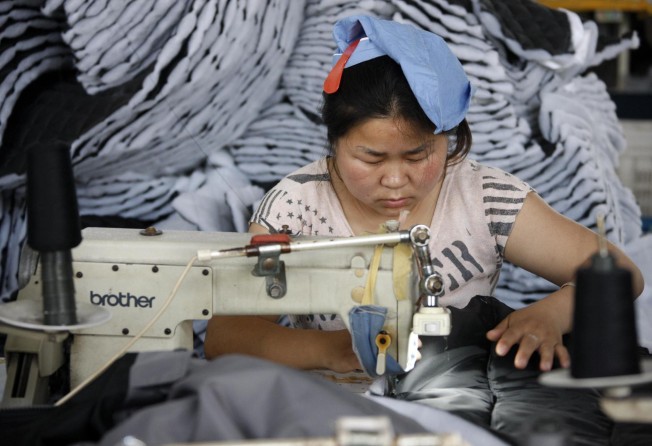
Cheap labour not the only driver of factories' flight from China
While higher labour costs are often cited for foreign buyers' switch to other Asian countries, rising industrial tension is hastening the trend

Foreign buyers are fleeing China for Bangladesh, Cambodia and Indonesia not just for cheaper labour but also because of rising tensions between the workers and their employers, in some cases because of poor corporate social responsibility on the part of the companies.

Larsen said the shift from China to other Asian countries had little to do with cost, although that had been widely perceived as a major reason.
"In simple garment manufacturing, the direct labour cost is rarely above 10 per cent of the FOB [free-on-board] price," he said. "Today, we buy better products, produced under higher ethical standards, in Bangladesh than in China," said Larsen, who has travelled in China as a buyer over the past 20 years.
His comments appear to be at odds with reports of fires and a factory collapse in Bangladesh within the past two years that killed many workers.
But Mainland Headwear, which operates factories in Shenzhen, Panyu in Guangzhou, and in Bangladesh, has seen the tightening in the requirements for fire equipment and building safety in the South Asian country.
"My new factory in Bangladesh has installed an automatic fire extinguisher and alarm system that connects to the central monitoring system in the fire department," said Pauline Ngan Po-ling, the deputy chairman and managing director of Mainland Headwear. "The whole system cost north of HK$1 million."
Ngan said that compared with Chinese workers, Bangladeshi and Vietnamese workers were more aware of their rights. "There are over 30 labour unions in Bangladesh, so labour rights are more protected in that country," she said.
Larsen blamed the piece-rate system in China and unpredictable movements in the migrant workforce for uneven product quality and poor standards of corporate social responsibility.
In China, wages, especially for the textile and apparel industries, are mainly determined by the number of pieces done. In Bangladesh and other Asian countries, the workers were paid monthly salaries, Ngan said.
To earn more, Chinese workers are motivated to seek extra shifts that usually break the labour law. China has the toughest rules in the region regarding maximum working hours. It caps overtime at 36 hours a month, based on five workdays a week. Bangladesh's limit is 50 hours a month, based on six workdays.
Some factories run by Chinese owners would not pay for extra shifts in full, and their workers were not covered by the required insurance, Ngan said. "So they can operate at costs some 35 per cent lower than those of us [who comply with the rules]," she said.
Ngan blamed the cutting of corners on the big multinational clients, which she said always demanded prices below the costs of factories that fully complied with regulations.
"The lower labour costs in Bangladesh and Cambodia offer more leeway for manufacturers to provide more benefits to their workers," she said.
For example, Ngan has set up a charity fund for her 1,500 workers and their neighbourhoods in Bangladesh.
While enjoying a close relationship with her workers in Bangladesh, Ngan said her relationship with some of her Chinese employees had turned sour.
When she tried to relocate more than 100 workers from her Panyu factory to a nearby plant because the one in Panyu was too big for present levels of production, Ngan had a nasty surprise. The workers asked for termination fees that totalled about 2 million yuan (HK$2.54 million).
"It's not reasonable. I didn't fire them. I just wanted to relocate them to a factory just a 10-minute car ride away," Ngan said.
The workers have filed their claims with the labour bureau.
Ngan said she would expand the workforce at the factory in Bangladesh to more than 4,000 while gradually scaling down the production line in Shenzhen.